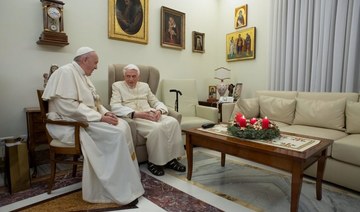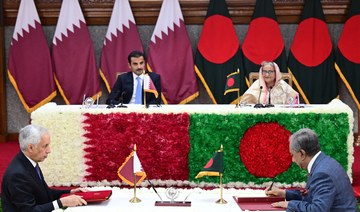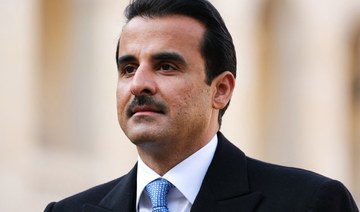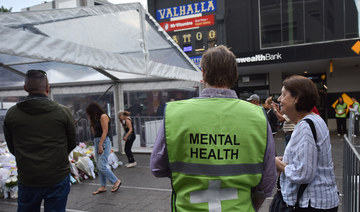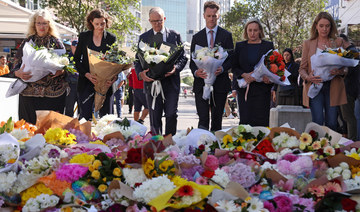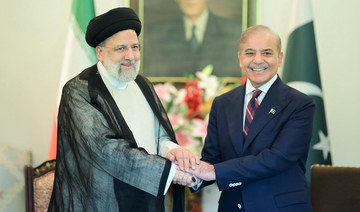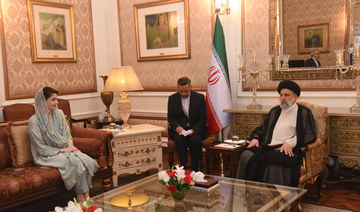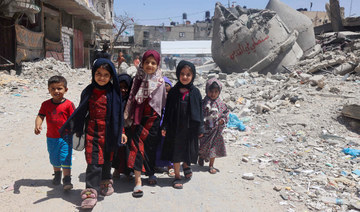BERLIN: The Rev. Georg Ratzinger, the older brother of Emeritus Pope Benedict XVI, who earned renown in his own right as a director of an acclaimed German boys’ choir, has died at 96.
The Regensburg diocese in Bavaria, where Ratzinger lived, said that he died on Wednesday. His death came just over a week after Benedict made a four-day visit to Regensburg to be with his ailing brother.
Ordained on the same day as his brother, Ratzinger proved to be a talented musician and went on oversee the recording of numerous masterpieces and concert tours around the world by the Regensburger Domspatzen, a storied choir that traces its history back to the 10th century. But his reputation was tarnished as he apologized for using corporal punishment to discipline boys amid a wider investigation into sexual and physical abuse in the Church.
He remained extremely close to his brother throughout his career, expressing dismay when Joseph Ratzinger was elected pope that the stress would affect his health and that they would no longer spend so much time together.
The pope had his quarters in the Apostolic Palace modified with a special apartment for his brother, who traveled frequently from his home in the Bavarian city of Regensburg to Rome. Elected to the papacy in 2005, Benedict stepped down in 2013 and was succeeded by current Pope Francis.
The two came from a religious Catholic family, the sons of police officer Josef and Maria Ratzinger, and great nephews of the German politician Georg Ratzinger, a priest and social reformer who was a member of the Bavarian and Federal parliament.
Born Jan. 15, 1924 in the Bavarian town of Altoetting, Georg Ratzinger showed an early talent for music, playing the church organ at age 11. The family eventually settled outside nearby Traunstein in 1937, where he and his brother joined the seminary. During World War II, Ratzinger told The Associated Press in an interview that he remembered huddling with the blinds drawn with his younger brother and father listening to Allied radio broadcasts, because their father wanted them to know the truth about the Nazi regime.
Though the Ratzinger family was anti-Nazi, Georg Ratzinger was enrolled into the Hitler Youth in 1941. In his book, “Salt of the Earth,” Benedict remarked on the time and his own subsequent enrollment at age 14. Official details of the boys’ Hitler Youth days no longer exist, as all of the organization’s archives for the area were burned ahead of the American advance at the end of the war.
In 1942, Ratzinger was drafted into a federal labor force, and the same fall entered the regular German armed forces as a radio operator in a signals unit. After serving in France, the Netherlands and Czechoslovakia, Ratzinger was sent in 1944 to Italy where he was wounded in fighting.
He was captured by US forces and spent the rest of the war as a POW, returning to Traunstein in July 1945 — a day the then-Joseph Ratzinger recalled in his memoir “Milestones,” remembering that the family had no idea if Georg were alive or dead.
“A quiet worry hung over our house...” he wrote. “Suddenly, on a hot July day, we steps were audible and he whom we had missed for so long was again standing in our midst, tanned from the Italian sun. Then he sat down at the piano, thankful and relieved, and intoned ‘Holy God We Praise Thy Name.’”
Following the war, the brothers entered the seminary of the archdiocese of Munich and Freising to study for the priesthood. They were ordained together on June 29, 1951, in the Cathedral at Freising on the Feast of Saints Peter and Paul.
After working his way up as priest in the region, Georg Ratzinger was appointed musical director of St. Peters Cathedral in Regensburg in 1964, becoming the conductor of the famed cathedral choir, the Regensburger Domspatzen.
As head of this world-renowned choir, whose name means “Cathedral Sparrows,” Ratzinger helped build its reputation around the world, running tours that included trips to the Vatican, the United States, Canada, Poland and Japan and performances for Queen Elizabeth II and Pope John Paul II.
But well after his retirement from the post, revelations of sexual and physical abuse at the choir haunted him.
In 2010, Ratzinger apologized for using corporal punishment to discipline boys in the choir, saying he was aware of allegations of physical abuse at an elementary school linked to the choir but did nothing about it.
“At the beginning I also repeatedly administered a slap in the face, but always had a bad conscience about it,” Ratzinger told the Passauer Neue Presse, adding that he was happy when corporal punishment was made illegal in 1980. “Of course, today one condemns such actions; I do as well. At the same time, I ask the victims for pardon.”
He claimed he was completely unaware of allegations of sexual abuse, which he said dated from before his tenure as choir director.
“These things were never discussed,” Ratzinger said. “The problem of sexual abuse that has now come to light was never spoken of.”
His relationship with his brother always played a special role in his life.
Ratzinger once lamented in an interview that his brother’s role as pope would mean “family life might be a bit more limited” and acknowledged that he “had hoped that the cup would pass him by.”
Still, Georg traveled to the Vatican for his brother’s installation, and was given a prominent seat on the basilica esplanade.
While visiting the pope in August 2005, Ratzinger was hospitalized in Rome because of an irregular heartbeat and had a pacemaker implanted. Benedict visited him while he was in the hospital.
In October of that year, the brothers got together again. “Sanctus,” a piece Georg Ratzinger composed was played at a Vatican concert for the pope and sung by the Domspatzen, while both brothers watched on together.
As Ratzinger’s health failed, his brother came to Regensburg in mid-June to visit with him.
Benedict’s trip to Germany was his first trip outside Italy in over seven years. Benedict greeted old neighbors and prayed at his parents’ grave. He stayed at a seminary during his trip, visiting his brother twice a day.
Ratzinger’s only close living relative is Benedict. His sister Maria, died in 1991.
There was no immediate word on funeral arrangements.
Retired Pope Benedict XVI’s elder brother, Georg Ratzinger, dies at 96
https://arab.news/4cjeh
Retired Pope Benedict XVI’s elder brother, Georg Ratzinger, dies at 96
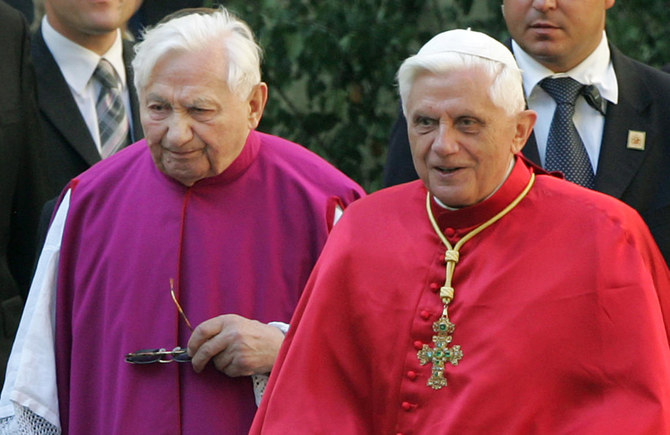
- His death came just over a week after Benedict made a four-day visit to Regensburg to be with his ailing brother
Four injured as escaped army horses bolt through central London
Photos and video posted on social media by British news outlets showed two horses running along busy roads, dodging buses, taxis and other traffic.
Both were wearing saddles and bridles, with one apparently covered in blood on its chest and forelegs.
A number of prestigious army cavalry regiments have stables in the British capital and horses are a regular sight around government buildings on Whitehall, Buckingham Palace, The Mall and in nearby Hyde Park.
London Ambulance Service said it was called at 8:25 am (0725 GMT) to reports of a person being thrown from a horse on Buckingham Palace Road.
No details were released on the injured people or the exact circumstances of their injuries.
The driver of a Mercedes car told LBC radio he had been waiting outside a hotel in Buckingham Palace Road when he felt something smash into his car.
He said he saw three or four horses near the vehicle, and that an army rider had been thrown off and injured.
One horse also reportedly crashed into a parked double-decker tour bus, smashing the windscreen.
One commuter shared a video on social media platform X, formerly Twitter, showing a black horse and a white horse being pursued by a black car.
“It was the street from Tower Bridge toward Limehouse Tunnel... just running past cars and an unmarked Range Rover following them,” the person said.
Up to seven horses initially got loose, Britain’s domestic Press Association news agency reported, with police working with the army to recapture them.
The army said in a statement that “a number of military working horses became loose during routine exercise this morning.”
“All of the horses have now been recovered and returned to camp. A number of personnel and horses have been injured and are receiving the appropriate medical attention,” it added.
Two of the horses were recaptured by the City of London Police, which polices the Square Mile financial district.
It said officers had contained two animals and that “an army horse box had collected the horses and transported them to veterinary care.”
Nepal’s president asks visiting Qatari emir to help free student held hostage by Hamas

- Al-Thani said he would do everything possible to help release Bipin Joshi
- Joshi was among 17 Nepali students studying agriculture in Alumim kibbutz
Katmandu, Nepal: Nepal’s president asked the emir of Qatar, who is on a two-day visit to the South Asian country, to help release a Nepali student held hostage by Palestinian militant group Hamas, officials said on Wednesday.
President Ram Chandra Poudel met with Sheik Tamim bin Hamad Al-Thani at the president’s house in the capital, Katmandu.
Al-Thani said he would do everything possible to help release Bipin Joshi, the Nepali president’s press adviser, Kiran Pokharel, told The Associated Press.
Joshi was among 17 Nepali students studying agriculture in Alumim kibbutz, near the Gaza Strip, when Hamas attacked Southern Israel on Oct.7. Ten of the students were killed, six injured while Joshi was abducted and taken to Gaza.
Though there has been no information on his condition or whereabouts, Nepali officials said they believed he was still alive.
Hamas’ sudden attack on Israel in October killed 1,200 people and some 250 others hostage were taken hostage. This has sparked a war that has so far killed more than 34,000 Palestinians in Gaza, at least two-thirds of them women and children, according to the local health ministry.
Qatar has played a key intermediary role throughout the war in Gaza. Along with the US and Egypt, the Gulf State was instrumental in helping negotiate a brief halt to the fighting in November that led to the release of dozens of hostages.
Pokharel also said the emir discussed the conditions of an estimated 400,000 Nepali migrant workers residing in Qatar, who mostly work in construction and manual labor. Concerns about working in extreme heat — that could reach over 40 C (104 F) — inadequate living facilities and abuse have risen in recent years.
Human Rights Watch released a statement on Sunday, asking that labor protection for migrant workers be prioritized during the emir’s visit.
The emir said there were programs planned to help Nepali workers find employment in other sectors, Pokharel said.
Al Thani also said his country planned to cooperate with Nepal on building hydropower plants, food production, and in the agriculture and tourism sectors.
The emir’s stop in Katamdnu is his last after visiting Bangladesh and the Philippines. He flies home later on Wednesday.
Australian counter terrorism force arrests seven teenagers after Sydney bishop stabbing
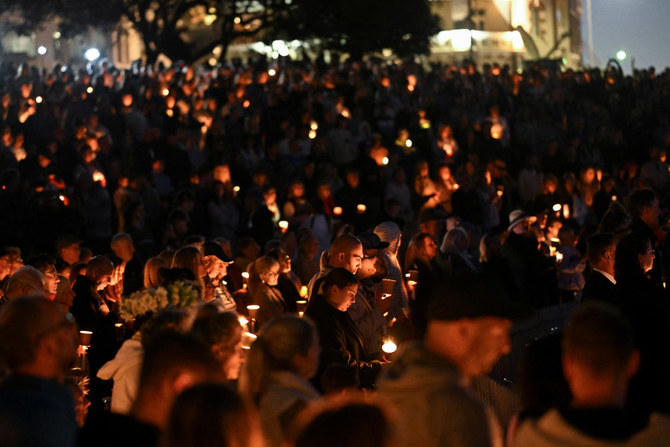
- A team of more than 400 police and security personnel were involved in the operation
- Police said they took the teens into custody because they posed an “unacceptable risk” to society
SYDNEY: An Australian counter terrorism team arrested seven teenagers on Wednesday linked to a boy charged with a religiously-motivated terror attack on a Sydney bishop and questioned another five people.
Police said a team of more than 400 police and security personnel were involved in the operation, which arrested associates of a 16-year-old boy charged with a terrorism offense for the knifing of Assyrian Bishop Mar Mari Emmanuel during a live-streamed church service on April 15.
Police said they took the teens into custody because they posed an “unacceptable risk” to society. They will allege the teens believed in a religiously motivated violent extremist ideology. A further five people are being questioned by police.
“I can assure the community there is no ongoing threat to the community, and the action we have taken today has mitigated any risk of future or further harm,” said New South Wales state Police Deputy Commissioner David Hudson at a news conference following the arrests.
Police said in a statement that the operation was ongoing.
Coming only days after a deadly mass stabbing in Bondi, the attack on Emmanuel and fears of further attacks or reprisals against the city’s Muslim community have put the normally peaceful Sydney on edge. Gun and knife crime is rare in the city, one of the world’s safest.
The Joint Counter Terrorism Team (JTT) operation, which involved 13 raids in Sydney and the regional town of Goulburn, was a combined effort between state and federal police as well as the domestic intelligence agency.
A significant amount of electronic material was seized in the raids, police said in a statement.
Australia’s top domestic spy chief on Tuesday asked technology companies to give it access to user messages in limited circumstances so it could fight extremists.
Iran president arrives in Sri Lanka as minister sought for arrest
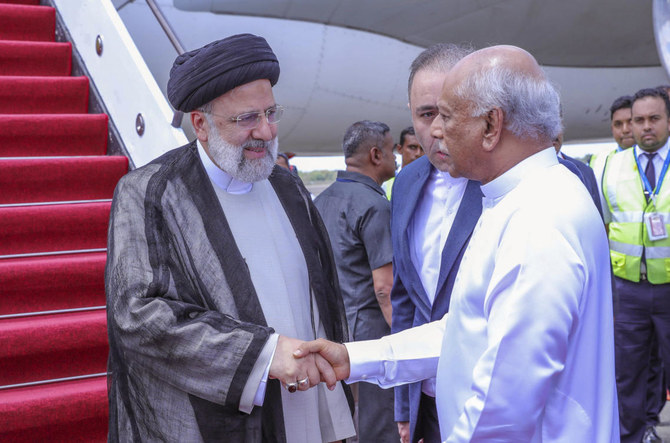
- Raisi traveled to the island nation after concluding a state visit to Pakistan
- Raisi arrived in Sri Lanka to inaugurate $514 million Uma Oya irrigation and hydro-electricity project
COLOMBO: Iranian President Ebrahim Raisi arrived in Sri Lanka on Wednesday to inaugurate a power and irrigation project, unaccompanied by his interior minister who is being sought for arrest over a deadly 1994 bombing.
Raisi traveled to the island nation after concluding a state visit to Pakistan alongside Ahmad Vahidi, accused by Argentina of orchestrating the 1994 attack on a Jewish community center in Buenos Aires that killed 85 people.
Interpol issued a red notice requesting police agencies worldwide to take Vahidi into custody, and Argentina had asked both Pakistan and Sri Lanka to arrest him.
But the minister was not seen accompanying Raisi, who had arrived in Sri Lanka to inaugurate an Iran-backed power and irrigation project.
Iran’s official news agency IRNA reported that Vahidi was back in Iran on Tuesday, where he attended a ceremony to induct a new provincial governor.
An official from Sri Lanka’s foreign ministry told AFP that the interior minister was not listed as part of the Iranian delegation.
The 1994 assault has never been claimed or solved, but Argentina and Israel have long suspected the Iran-backed group Hezbollah carried it out at Iran’s request.
Prosecutors have charged top Iranian officials with ordering the attack, though Tehran has denied any involvement.
The court also implicated Hezbollah and called the attack against the AMIA — the deadliest in Argentina’s history — a “crime against humanity.”
Delayed project
Raisi arrived at an airport in southern Sri Lanka on Wednesday morning to inaugurate the Iran-backed $514 million Uma Oya irrigation and hydro-electricity project.
It was due to be commissioned in March 2014 but sanctions against the Islamic Republic saw the project mired in a decade of delays, Sri Lanka has said.
Sri Lanka funded most of the $514 million project after an initial investment of $50 million from the Export Development Bank of Iran in 2010, while construction was carried out by Iranian firm Farab.
Sri Lanka President Ranil Wickremesinghe’s office said Raisi’s visit symbolized “the cooperation between the two nations in this significant infrastructure endeavour.”
The two reservoirs are slated to irrigate 4,500 hectares (11,100 acres) of new land, while the hydro dam generators have a capacity of 120 megawatts.
Iran is a key buyer of Sri Lanka’s tea, the island’s main export commodity.
Sri Lanka is currently repaying a legacy debt of $215 million for Iranian oil by exporting tea. The country’s only oil refinery was built by Iran in 1969.
Raisi arrived in Sri Lanka after a three-day visit to Pakistan that followed tit-for-tat missile strikes in January in the region of Balochistan, which straddles the two nations’ porous border.
Tehran carried out the first strikes against an anti-Iran group inside Pakistan, with Islamabad retaliating by hitting “militant targets” inside Iran.
Both nations have previously accused each other of harboring militants on their respective sides of the border.
Ending Mideast conflict not a priority for most Americans: Survey
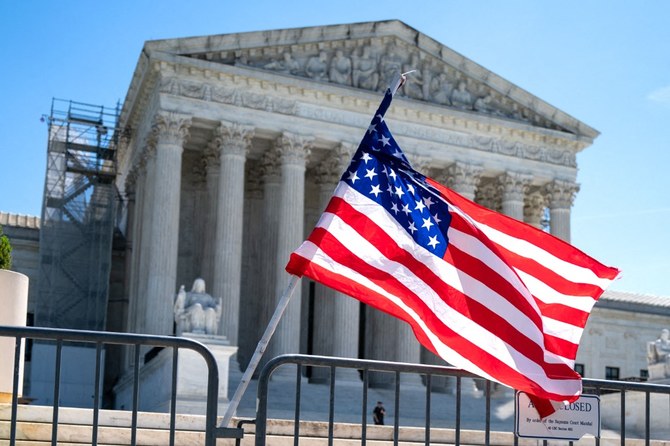
- 83% of respondents say Biden should focus on domestic policy
- 31% say supporting Israel should be given no priority
Chicago: A majority of Americans do not see the Israeli-Palestinian conflict as a foreign policy priority, according to two new concurrent surveys by the Pew Research Center.
Americans identified as their top four of 22 foreign policy priorities protecting the country from terrorism (71 percent), reducing illegal drugs (64 percent), preventing the spread of weapons of mass destruction (63 percent) and maintaining a military advantage over foreign powers.
Finding a solution to the Israeli-Palestinian conflict drew 29 percent, ranking only 14th among the 22 priorities.
The question of “supporting Israel” ranked even lower at 20th with 22 percent, with 31 percent opposing that support.
“Overall, a majority of Americans say that all 22 long-range foreign policy goals we asked about should be given at least some priority. Still, about three in 10 say supporting Israel, promoting democracy in other nations (28 percent) and supporting Ukraine (27 percent) should be given no priority,” Jacob Poushter, Pew associate director of research, told Arab News.
“Even with these priorities, 83 percent of Americans say it is more important for President Joe Biden to focus on domestic policy, compared with 14 percent who say he should focus on foreign policy.
“In 2019, 74 percent wanted then-President Donald Trump to focus on domestic policy, and 23 percent said he should focus on foreign policy.”
Pew researchers said finding a solution to the Israeli-Palestinian conflict was previously “a priority that saw no partisan difference at all” in a 2018 survey.
But the new surveys show a “partisan gap” emerging, with twice as many Democrats (36 percent) today than in 2018 calling the conflict “a priority,” while the share of Republicans (20 percent) has remained constant.
Twenty-nine percent of Americans say they have a great deal or fair amount of confidence in the UN’s ability to provide effective humanitarian aid to Gaza. Fifty-one percent do not have confidence and 19 percent are unsure.
Only 15 percent of Americans say they have confidence in the UN’s ability to enforce a ceasefire between Israel and Hamas. Sixty-seven percent have no confidence and 17 percent are unsure.
A recent Pew survey found that only 12 percent of Americans believe that lasting peace between Israelis and Palestinians is at least somewhat likely.



